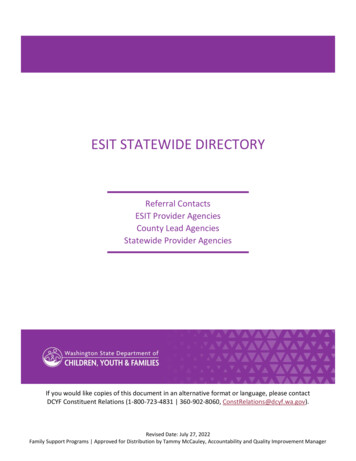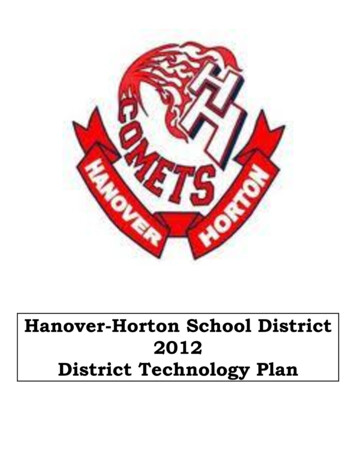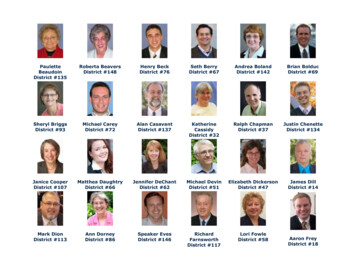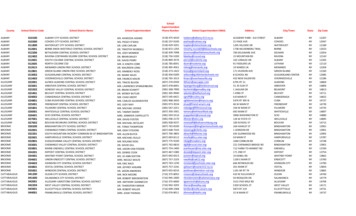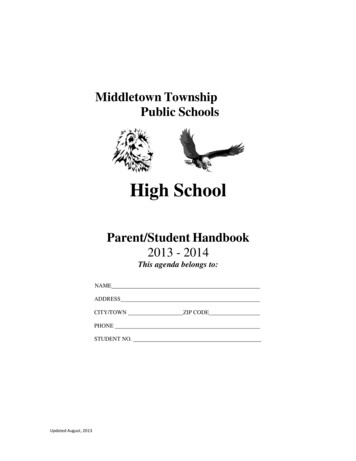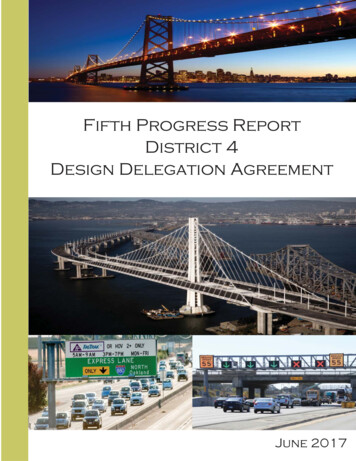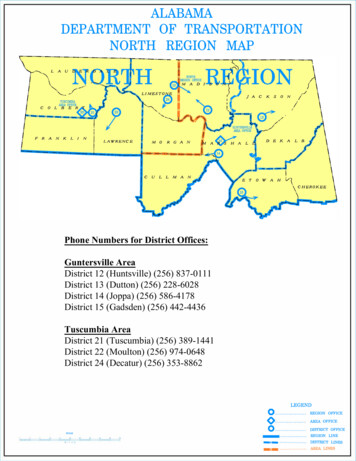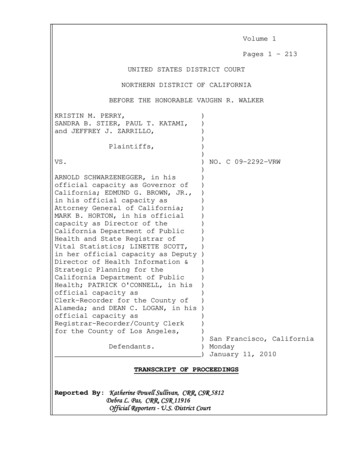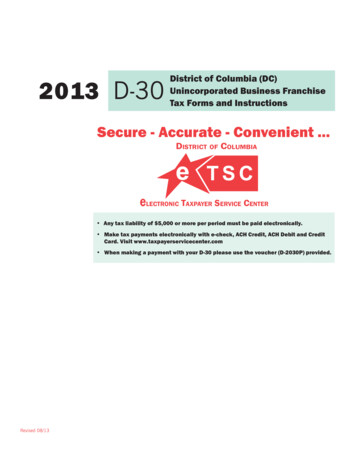
Transcription
2013 D-30District of Columbia (DC)Unincorporated Business FranchiseTax Forms and InstructionsSecure - Accurate - Convenient .DISTRICT OF COLUMBIAeLECTRONIC TAXPAYER SERVICE CENTER Any tax liability of 5,000 or more per period must be paid electronically. Make tax payments electronically with e-check, ACH Credit, ACH Debit and CreditCard. Visit www.taxpayerservicecenter.com When making a payment with your D-30 please use the voucher (D-2030P) provided.Revised 08/13
What’s New: Form D-2220 Underpayment of Estimated Franchise Tax By Businesses has beenadded in the forms section of this booklet. A “Fill in this oval if Form D-2220 is attached” has been added to the D-30 form,page 2 under Payments and refundable credits, Line 41(b).Clarification: Line 30 Clarification - Add the post-apportioned distributive share of the UB salary allowance attributable to the partner under DC Code §47-1803.03(a)(11) and the UB exemptionamount attributable to the partner under DC Code §47-1808.04 on Line 30 of the D-30.If filing a combined report, this amount will be reflected as an addition under the partner’scolumn on Line 33 of Schedule 1 of the combined report.Also you must include a statement to reflect the specific amounts for each of the items listedbelow:-Portion of line 26(c) attributable to DCPortion of UB salary allowance attributable to DCPortion of UB exemption attributable to DC
ContentsWho must file Form D-30?4Who does not have to file Form D-30?5Which other DC forms may you need to file?5When are your taxes due?6How to file your return6Payment options6Penalties and interest6Explanation of terms8Specific instructions for the 2013 Form D-308Form D-30 Unincorporated Business Franchise Tax Return15Worldwide Combined Reporting Election Form21Schedule UB Business Credits23D-2220 Underpayment of Estimated Franchise Tax by Businesses35Form D-2030P Payment Voucher37Form FR-128 Extension of Time to File a DC Franchise or Partnership Return39Form D-30 NOL Net Operating Loss Deduction for Years before 200041Form D-30 NOL Net Operating Loss Deduction for Year 2000 and Later43Need assistance?Note: At the time this tax package went to print, line references to federal tax forms were correct.Back Cover
4General Instructions for the D-30You may have to file other DC returns if you have other businessactivities with gross income of 12,000 or less and you operated as: A partnership, you must file a Form D-65; A DC resident sole proprietor, you must file a Form D-40; or A DC resident trust, you must file a Form D-41.Who must file Form D-30?Generally, an unincorporated business, with gross income (Line 10)more than 12,000 from District sources, must file a D-30 (whetheror not it has net income). This includes any business carrying onand/or engaging in any trade, business, or commercial activity in DCwith income from DC sources. To determine if you need to file, please note that gross incomeincludes revenue from all DC sources after deducting the costof goods sold, but before taking expenses and other deductionsallowed when calculating net income. The act of carrying on or engaging in a trade or business in DCis determined by the nature and extent of the unincorporatedbusiness’ activities in DC conducted by: its owners; members; orthrough employees, consultants, agents or other representatives.Multiple businessesIf an individual or group of individuals carries on two or more distinctunincorporated businesses in DC (none of which are exempt), theymust be reported on one return. Include all income and expenses onthat one return. You may provide separate computations to show thenet income or loss of each business.Taxicab/Limo DriversAny non-resident taxicab/limo driver who operates a motor vehicle forhire in the District must file a Form D-30. The filing of the D-30 isa requirement for operating or continuing to operate a motor vehiclefor hire in the District by a non-resident.An unincorporated business with gross income in DC of over 12,000from any of (but not limited to) the activities listed below, must alsofile a D-30 return. Rental of real or tangible personal property; or Leasing of real or tangible personal property; or Any other similar arrangement.Minimum TaxThe minimum tax is 250 if DC gross receipts are 1M or less.Minimum tax is 1,000 if DC gross receipts are greater than 1M.DC Gross receipts for purposes of minimum tax includes District grossreceipts that are derived from any activity such as sales, rents, services,commissions, etc., from any source within the District. Gross receiptsare determined without deduction of any expenses.If a business is terminated as the result of the sale of its assets, evenif there is no tax due, the business is required to file a final D-30.If the sale of a business’ assets results in termination of the business– the owner(s) must report gain/loss on their individual return. (Theremay also be depreciation recapture to report on a D-30.)Use Minimum Tax Liability Gross Receipts Worksheet (MTLGR) below.You must complete Schedule F even if your operation is 100% in theDistrict.NOTE: An unincorporated business with gross income of 12,000 orless is not required to file a D-30 return nor pay the 250 minimumfranchise tax.Minimum Tax Liability Gross Receipts (MTLGR) WorksheetDC gross receipts for minimum tax due and only for minimum tax due is computed as follows:1Amount from numerator of DC sales apportionmentfactor from Schedule F, Line 3, Column 2 of D-20 orD-301 2Add the adjusted basis of property (less depreciation)for which gains reported in Line 12 3Add Non-Business income allocated to DC reportedper D-20 Line 33 or D-30, Line 303 4Total DC Gross Receipts (Add Lines 1, 2 and 3)4 Minimum TaxThe minimum tax is 250.00 if the amount on Line 4 above is 1,000,000 or lessThe minimum tax is 1,000.00 if the amount on Line 4 above is greater than 1,000,000
5Who does not have to file Form D-30?You do not have to file if – Total gross income (Line 10) is 12,000 or less. The trade or business is by law, custom or ethics, unable toincorporate. It is a trade or business licensed by DC to a blind person, foroperating a stand in a federal building. It is a trade, business or professional organization where:80 percent or more of its gross income comes from personalservices actually rendered by owners and members of thebusiness; andCapital is not a material income-producing factor. You are:An organization recognized as exempt from DC taxes andhas unrelated business taxable income, as defined inInternal Revenue Code (IRC) §512, is subject to the DCfranchise tax and a Form D-20, Corporation Franchise TaxReturn, must be filed.A professional corporation, incorporated under the DCProfessional Corporation Act and, therefore, you must file aForm D-20.NOTE: The 80 percent requirement is met if the activities of youremployees, consultants and agents have or are presumed to haveproduced gross income for the business in an amount at least equalto the gross amount paid them. The 80 percent test is not satisfied ifthe amount paid these persons exceeded 20 percent of the business’gross income. If this test is not met, the business is not exempt fromDC tax and must file a D-30 return.NOTE: If an individual or group of individuals is engaged in twoor more separate and distinct businesses during the tax year, eachbusiness is separate when determining tax-exempt status.Which other DC forms or schedules may unincorporatedfranchise businesses need to file?To download DC tax forms, visit www.taxpayerservicecenter.com andclick on Tax Forms/Publications.Business Non-Refundable and Refundable Credits,Schedule UBThe various non-refundable and refundable credits available tobusinesses have been consolidated on Schedule UB. The total nonrefundable credits from Schedule UB, Line 14 are reported on Line39 of the D-30. The total refundable credits from Schedule UB, Line17 are reported on Line 41(c).FR-128, Extension of Time to File a DC Franchise or PartnershipReturnYou may request an extension of time to file your return by filing DCForm FR-128 (copy included in this booklet) no later than the returndue date. An extension of time to file is not an extension of timeto pay. You must pay any tax liability with the extension request,otherwise the request will be denied. Do not use the federal extensionform for DC tax purposes. For Combined report filers, the designatedagent shall file.D-30ES, Declaration of Estimated Franchise Tax forUnincorporated BusinessAn unincorporated business must file a declaration of estimatedfranchise tax if it expects its DC unincorporated business franchise taxliability to exceed 1000 for the taxable year. See the Form D-30ES,Declaration of Estimated Franchise Tax for Unincorporated Businessesbooklet for payment vouchers and details. You will automatically beassessed a penalty for any underpayment of DC estimated tax.Note: Electronic payment required. If your franchise estimated taxliability payment exceeds 5,000 within a period, you must payelectronically. Visit www.taxpayerservicecenter.com.D-2220, Underpayment of Estimated Tax InstallmentsYou will be charged 10 percent per year, compounded daily, onunderpayments of estimated franchise tax installment payments. Thecharge is computed from the installment payment due date to thedate the tax is paid. It is in addition to the penalty imposed for falsestatements. The 10 percent penalty will be assessed automaticallyby OTR’s integrated tax system. For additional information, see FormD-2220, Underpayment of Estimated Franchise Tax by Businesses.Attach a completed Form D-2220 with your D-30.FR-399, Qualified High Technology Company (QHTC)If you are a QHTC, you may be eligible for certain tax credits. Youmust file certain forms to claim these credits. For forms and details,see Publication FR-399, QHTC. FR-399 is available at www.taxpayerservicecenter.com and at our 4th Street location. If you area QHTC, fill in the ‘QHTC’ oval on Page 1 of the D-30 and attachthe QHTC-CERT form from the FR-399 to the Form D-30. If you areclaiming a QHTC retraining credit, attach completed Forms D-30CRand FP-332.If your company is a certified QHTC, please fill in the certified QHTCoval on page 1 of the D-30 and complete Lines 1-37 of the D-30.A QHTC is liable for paying the required 250 minimum tax. Attacha completed QHTC-Cert form to the D-30.FR-1500 Ballpark FeeIf you have 5 million or more in annual DC Gross Receipts, youmust file and pay the ballpark fee, with Form FR-1500 electronically.For additional details, visit www.taxpayerservicecenter.com, click on‘Business Tax Service Center’, and then click on ‘Ballpark-Related Feesand Taxes’. Note: Each member of a combined group is responsiblefor filing and paying its own ballpark fee.Combined ReportingThe District of Columbia no longer permits consolidated filing for taxyears beginning on and after January 1, 2011. For tax years beginningon and after January 1, 2011, a corporation or unincorporatedbusiness entity subject to tax in the District of Columbia, engaged ina unitary business with one or more corporations or unincorporatedbusiness entitites, is required to file a combined report pursuant toD.C. Official Code §47-1805.02a.Combined reporting is a tax reporting method where all of themembers of unitary group are required to determine their net incomebased on the activities of the unitary group as a whole. Unitarygroup members will calculate their taxable net income derived fromthe unitary business as its apportioned share of the income or lossof the combined group engaged in the unitary business.A “Unitary business” means a single economic enterprise that ismade up either of separate parts of a single business entity or of acommonly owned or controlled group of business entities that aresufficiently interdependent, integrated, and interrelated through theiractivities so as to provide synergy and mutual benefit that produces
6a sharing or exchange of value among them and significant flow ofvalue to the separate parts.The combined reporting regulations are contained in DCMR Title9, Taxation and Assessments, §§156 through 176. Examples andSchedules for combined reporting are located on our website atwww.taxpayerservicecenter.com under the “Combined Reporting forBusiness Entities” tab.When are your taxes due?If you are a calendar year filer, file your return and pay any tax dueby April 15th. If you are a fiscal year filer, file your return and payby the fifteenth day of the fourth month after your tax year closes. Ifthe due date falls on a Saturday, Sunday, or legal holiday, the returnis due the next business day.Taxable yearEnter your taxable year ending date on page 1 of the D-30. It may beeither a calendar year or fiscal year. You must receive OTR approvalto change your taxable year. Combined report filers shall use thedesignated agent’s tax year.NOTE: The District has decoupled from the section of the AmericanRecovery and Reinvestment Act of 2009 which allows an exclusionand deferral from gross income of a discharge of indebtedness. ForDistrict tax purposes, a discharge of indebtedness results in incomethat is includible in gross income.How to file your returnBy mailPayment OptionsRefer to the Electronic Funds Transfer (EFT) Payment Guideavailable on the DC website at www.taxpayerservicecenter.com forinstructions for electronic payments.Payment options are as follows: Electronic check (e-check). E-check is similar to ACH debit,but it is a one-time transaction where the taxpayer providesthe banking information at the time of payment instead of storing the information. There is no fee for business e-check payments. eTSC does not allow the use of foreign bank accountsfor business e-check. ACH Credit. ACH credit is for business taxpayers only. Thereis no fee charged by OTR, but the taxpayer’s bank may chargea fee. The taxpayer directly credits OTR’s bank account. Ataxpayer does not need to be eTSC registered to use this payment type, and does not need access to the website.Note: When making ACH Credit payments through your bank,please use the correct tax type code (00260) and tax period ending date (YYMMDD). ACH Debit. ACH debit is for registered eTSC business taxpayers only. There is no fee. The taxpayer’s bank routing andaccount number are stored within their online eTSC account.They can then use this account to pay any existing liability. Inthis instance, they give OTR the right to debit the money fromtheir bank account. eTSC does not allow use of foreign bankaccounts for business ACH Debit. Credit/Debit Card. The taxpayer may pay the amount owedusing Visa, MasterCard, Discover or American Express. Youwill be charged a fee equal to 2.5% of the tax payment. Thefee is paid directly to the District’s credit card service provider.Payment is effective on the day it is charged. Check or money order. Include a check or money order, payable to the DC Treasurer, with your completed return. Writeyour Federal Identification Number (FEIN), daytime telephonenumber, ‘2013’, and D-30. Attach your payment to the FormD-2030P Payment Voucher provided in this booklet. Mail theD-2030P with, but not attached to the D-30 tax return to:Office of Tax and RevenuePO Box 96165Washington, DC 20090-6165 If mailing a return with a payment, make the check or moneyorder payable to the DC Treasurer. Write your FEIN, D-30, andthe tax year on the payment. Staple your payment to the voucherForm D-2030P and fill in the oval for D-30 return. Do not attachthe D-2030P and payment to the return D-30. Send your returnand payment to:Office of Tax and RevenuePO Box 96165Washington, DC 20090-6165 If mailing a no payment due or refund return, send the returnto:Office of Tax and RevenuePO Box 96193Washington, DC 20090-6193Note: Dishonored payments. Make sure your check will clear. Youwill be charged a 65 fee if your check is not honored by your financial institution and returned to OTR.Mail labels for these two post office boxes are on the back flap of thereturn envelopes included in this booklet.Note: International ACH Transaction (IAT). Electronic banking ruleshave changed. If you request your refund to be direct deposited into anaccount outside of the United States, you will receive a paper check.Send in your original DC return with any schedules, not acopy. Fold your return once. Be sure to keep a copy for yourrecords.Your payment cannot be drawn on a foreign account. Pay by moneyorder or credit card instead.By accessing the DC Electronic Taxpayer Service Center(eTSC)Unincorporated business taxpayers may file the D-30ES, Declarationof Estimated Franchise Tax for Unincorporated Businesses, or the FR128, Extension of Time to File a DC Franchise or Partnership Returnby accessing the DC eTSC website. There is pre-registration required.Allow 5-7 days for processing. Visit www.taxpayerservicecenter.comfor information on completing an eTSC application.Penalties and interestOTR will charge – A penalty of 5% per month if you fail to file a return or payany tax due on time. It is computed on the unpaid tax for eachmonth, or fraction of a month, that the return is not filed or thetax is not paid. It may not exceed an additional amount equal
7 to 25% of the tax due;A 20% penalty on the portion of an underpayment of taxes ifattributable to negligence. Negligence is a failure to make a reasonable attempt to comply with the law or to exercise ordinaryand reasonable care in preparing tax returns without the intent todefraud. One indication of negligence is failure to keep adequatebooks and records;Interest of 10% per year, compounded daily, on a late payment;A one-time fee to cover internal collection efforts on any unpaidbalance. The collection fee assessed is 10% of the tax balancedue after 90 days. Payment received by OTR on accounts subjectto the fee are first applied to the fee then to penalty, interest andtax owed;A civil fraud penalty of 75% of the underpayment which is attributable to fraud (see DC Code §47-4212).Special circumstancesSpecial rules on depreciation and §179 propertyFor federal tax purposes, businesses are allowed to deduct additional bonus depreciation and additional Internal Revenue Code (IRC)§179 expenses.For DC tax purposes, you may not claim the 30 or 50 percent federal bonus depreciation or additional expenses allowed under IRC§179.Similarly, DC does not allow the acceleration of depreciation deductions currently allowed under the 2008 Economic Stimulus Act.Office of Tax and Revenue (OTR) rulingsAll rulings issued prior to December 31, 2002 were revoked. Taxpayers cannot rely on these rulings unless they were re-submittedto the OTR for review, and if approved, reissued. Direct any rulingquestions to OTR, General Counsel at (202) 442-6500.Amended returnsYou must use the D-30 tax form of the year you are amending.If the return is for tax year 2001 or later, fill in the ‘Amended Return’oval on Page 1 of the D-30 and complete the ‘Tax Year Ending’ box.Attach a detailed statement of the adjustment(s) and the amount ofany refund received.If the Internal Revenue Service (IRS) adjusts your federal return orif you file an amended federal return, you must file an amended DCreturn within 90 days of the date of the IRS notice. If the federaladjustment makes you eligible for a DC tax refund, you must file forthe DC refund within 180 days of notice of the adjustment.Mail the amended return with payment and any additional attachments to theOffice of Tax and RevenuePO Box 96165Washington, DC 20090-6165Mail the amended return if no payment due or refund and any additional attachments to theOffice of Tax and RevenuePO Box 96193Washington, DC 20090-6193Final returnIf you are not required to continue filing a return due to the endingof business operations, shade the ‘fill in if final return’ oval on thereturn. We will then cancel your filing requirement. Do not use thisoval to indicate the return is the final for the period being reported.Getting startedTo complete the Form D-30, in general you will need: A pen with black ink A calculatorNot all items will apply. Fill in only those that do apply. If an amountis zero, make no entry, leave the line blank.All entries on the return, combined schedules, and attachments arewhole dollars only. Do not enter cents. Round cents to the nearestdollar. Examples: 10,500.50 rounds to 10,501 10,500.49 rounds to 10,500Taxpayer Identification Number (TIN)You must have a TIN, whether it is a Federal Employer IdentificationNumber (FEIN), Social Security Number (SSN) or Preparer TaxIdentification Number (PTIN). A FEIN is a number issued by the IRS. To apply fora FEIN, get Form SS-4, Application for Employer IdentificationNumber, or get this form online at www.irs.gov/businessesand click on Employer Identification Number (EIN) underStarting a Business. You may also get this form by calling1-800-TAX-FORM (1-800-829-3676); A SSN is a valid number issued by the Social SecurityAdministration (SSA) of the United States Government. To applyfor a SSN, get form SS-5, Application for a Social Security Card,from your local SSA office or get this form online at www.ssa.gov. You may also get this form by calling 1-800-772-1213;Franchise tax rate and minimum taxThe tax rate is 9.975 percent on your “Total District taxable income”on Line 36. The minimum tax is 250, even if you have a loss. Ifyour DC gross receipts are more than 1,000,000, the minimumtax is 1,000.Incomplete forms will delay processingComplete all items on the D-30 and all applicable schedules includingcombined schedules, otherwise OTR will send the return back to youfor completion and resubmission.Help us identify your forms and attachmentsWrite your FEIN/SSN, tax period, business name and address onany statements submitted with the return or filed separately. Youridentification number is used for tax administration purposes only.For members filing under combined reporting, please ensure youplace your EIN in the ‘Federal Employer I.D. Number’ field andthe designated agent’s FEIN in the ‘Designated Agent FEIN’ field.Members must also complete the “Fill in if Combined Return” andthe “Fill in if Final Return” ovals.Note: The District will allow submission of the D-30 return usinga CD. D-30 filers must print and submit pages 1-6, ScheduleUB, Worldwide Combined Reporting Election Form and combinedschedules, if applicable. All other attachments must be on the CD.The CD should include a copy of the entire return and indicate onthe CD the FEIN/SSN. Images on the CD should be submitted inPDF format.
8Filling out the formTo aid us in processing your return, please follow these rules:Do not print outside the boxes.RO B E R T S Write 3s with a roundedtop, not a flat top.Write 7s without amiddle bar.37 37Explanation of termsELM Fill in ovals completely.Do not “ “ or “x” ovals.Do not enter cents. Roundcents to the nearest dollar. 8 Leave a space betweenwords and betweenwords and numbers. x.005 7 2 0 4 .00 Use black ink.Print in CAPITAL letters.Preparer Tax Identification Number (PTIN)IRS rules have changed. If you are a paid preparer, you are required tohave a PTIN issued by the IRS. A PTIN is a number issued and authorizedby the IRS to file a return on the taxpayers’ behalf.Note: Your social security number is used for tax purposes only.Personal InformationComplete the personal information as instructed, using CAPITALletters and black ink. Use one block per letter, including a spacebetween address fields. Please write clearly, otherwise, processingmay be delayed.Assembling your D-30 return Do not staple ot otherwise damage the Bar Code located inthe upper right hand corner of this form or schedule(s) beingattached; Do not cross out the tax year on the 2013 return. If you arenot filing a 2013 D-30 Unincorporated Business FranchiseTax Return, do not use this booklet. Request a booklet for thespecific year you are filing by calling our Forms Center at (202)442-6546, or visit the Customer Service Center at 1101 4thStreet, SW, 2nd Floor, Washington, DC 20024. You also mayvisit our website at www.taxpayerservicecenter.com for prior yearcorporate franchise tax returns. Attach any other supporting forms or schedules as applicable:o Worldwide Combined Reporting Election formo Other Combined Reporting Schedules as requiredo Federal Schedule M-3o Federal UTPo Any other forms or schedules Staple your check or money order to the D-2030P, PaymentVoucher, completing the oval for the D-30. Use the appropriate mailing label on the back flap of the returnenvelope.Signature and verificationAn authorized officer or designated agent of the corporation must signand date the return. A receiver, trustee, or assignee must sign anyreturn that he/she is required to file for the corporation. Any personwho prepared the return for compensation must also sign, date andprovide the necessary identification number. If a firm or corporationprepares a return, it should be signed in the name of the entity. Thesignature requirement does not apply when a taxpayer’s regularemployee prepares the return. Please review the tax return beforeyou allow a paid preparer to issue a return on your behalf.Business incomeIncome from transactions and activities in the regular course of thetaxpayer’s trade or business is business income. This includes incomefrom tangible and intangible property if the acquisition, managementand disposition of the property are part of the taxpayer’s regulartrade or business operations. Income of any type — manufacturingincome, compensation for services, sales income, interest, dividends,rents, royalties, gains, operating and non-operating income fromany class or from any source — is business income if it arises fromtransactions and activities occurring in the regular course of a trade orbusiness. Whether income is business or non-business depends onthe underlying transactions and activities which are the elements ofa particular trade or business. In general, transactions and activitiesthat depend on or contribute to the operation of your enterpriseconstitute your trade or business.Commercial domicileThe principal place from which you direct or manage your trade orbusiness.CompensationWages, salaries, commissions and other forms of remuneration paidor accrued to employees for personal services.Non-business incomeAll income except business income.Transportation companyAny business engaged in transporting persons, goods or property ofothers for hire.SalesAll gross receipts, including dividends, interest and royalties,considered to be business income which are not required to beallocated.Taxable in another stateFor purposes of allocating non-business income and apportioningbusiness income to another state, you must be subject to a net income tax, a franchise tax measured by net income, a franchise tax for the privilege of doing business, a corporate stock tax in that state, or that state has the jurisdiction to subject the taxpayer to an incometax regardless of whether, in fact, the state does or does not.Specific InstructionsNegative amountsIf you enter a negative amount on a line, fill in the oval to the leftof the entry where it states “Fill in if minus”. Do not enter a minussign or parenthesis.Allocation and apportionment of incomeYou must complete Schedule F even if your operation is 100% in theDistrict. Any unincorporated business carrying on a trade or businessin DC and other jurisdictions must apportion its business incomeamong DC and the other jurisdictions. Apportion the net income
9from trade or business activities using the appropriate apportionmentfactor. See Schedule F, page 4 of the D-30. You must allocate yournon-business income.Non-business income allocationNon-business incomeAllocate items of non-business income to DC. The following gains andlosses from sales or other dispositions of property are allocated to DC: Real property located in DC (other than realty used in the tradeor business whether held for sale or otherwise); Tangible personal property (other than any tangible personalproperty used in the trade or business whether held for sale orotherwise) if:- The property had a situs in DC at the time of sale or otherdisposition; or- Your principal place of business is in DC and you are nottaxable in the situs state. Intangible personal property (other than intangible personalproperty of any kind used in the trade or business whether heldfor sale or otherwise) is allocable to DC if your principal placeof business is in DC.determining factor in the trade or business, you must inventorymerchandise at the start and end of the tax year. You may value itat your cost or at the lower of cost or market, or by another IRSapproved method. You must continue to use the method chosen untilyou get permission from the Office of Tax and Revenue to change. Ifthe inventories do not agree with the balance sheet figures, attachan explanation.Cost of Operations (where inventories are not an income-determiningfactor). If the amount entered on Line 2, page 1, includes an amountapplicable to the cost of operations, attach a statement showing indetail: (1) salaries and wages; and (2) other costs.Line 3 Gross profitLine 1 minus Line 2. Enter the result on Line 3.Line 4 DividendsEnter the total of all taxable dividends. You may deduct SubpartF income (as defined in IRC §952). Attach a detailed statementshowing the calculation of the taxable amount.Allocate to DC net rents and royalties from DC located real property.Line 5 InterestEnter interest the business received or is credited with during thetax year, including that paid on obligations of a State, Territory of theUnited States, or any of their political subdivisions, except those of DC.Allocate to DC interest and dividends from sources in DC unlessspecifically excluded from taxation and/or subject to apportionmentas business income.Exclude interest income on obligations or securities issued by theUnited
† Any tax liability of 5,000 or more per period must be paid electronically. † Make tax payments electronically with e-check, ACH Credit, ACH Debit and Credit Card. Visit www.taxpayerservicecenter.com † When making a payment with your D-30 please use the voucher (D-2030P) provided. Revised 08/13 2013 D-30District of Columbia (DC)Unincorporated Business Franchise
